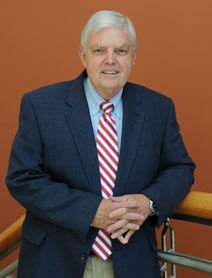


In 30+ years at Clemson, R. Larry Dooley began every day having ideas. These then turned into partnerships, alliances, and centers that continue to attract educators, researchers, and year after year, classrooms full of bioengineering students. Presently Professor Emeritus of Clemson University Department of Bioengineering, Dr. Dooley retired in 2016 after more than 30 years as a teacher, mentor, and author. He followed his career path at Clemson University as Director of the Bioengineering Alliance of South Carolina (1986-1994), Chair of the Department of Bioengineering (1994-2002), Associate Dean for Research and Graduate Studies in the College of Engineering and Science (2002-2011), Interim Dean of the College of Engineering and Science (2011-2012), and Interim Vice-President for Research at Clemson University (2013-2016). He served on numerous boards and was expert in scientific visualization, computational modeling, advanced manufacturing techniques and microstructural engineering of materials.
Dr. Dooley earned his B.S. in mechanical engineering at Virginia Polytechnic Institute and State University. He completed his Master’s work at Clemson University and in 1976, finished his Doctorate in bioengineering there. He was named professor of bioengineering at Clemson in 1985. Dr. Dooley served as Interim Vice President for Research at Clemson. In this role, he oversaw research and sponsored activities campus-wide. Earlier, Dr. Dooley was named Interim Dean of the College of Engineering and Science. In that capacity, he led 14 academic departments and an enrollment of 5,000 students, with 23 undergraduate and 45 graduate degree programs. Prior to his role as interim dean, Dr. Dooley served as Associate Dean for Research and Graduate Studies for the then College of Engineering and Science. He coordinated the college’s graduate-level activities—including oversight of the college’s research centers, alliances, and institutes.
Dr. Dooley’s vision was that founding alliances among state institutions of higher education would strengthen the state’s bid to attract research funding and increase collaborative relationships. The South Carolina Bioengineering Alliance (SCBA) was established by the state Commission on Higher Education in 1985 among Clemson University, the Medical University of South Carolina (MUSC), and the University of South Carolina (USC). From 1986-1994, Dr. Dooley directed the Alliance. Its mandate is to lead the state-wide initiative to promote and strengthen bioengineering research, education, and technology transfer. It so acts today, serving to organize and activate alliances that support the organization’s mandate.
In 1998, Dr. Dooley played a major role in convincing the National Science Foundation to fund the Center for Advanced Engineering Fibers and Films (CAEFF) at Clemson University and Massachusetts Institute of Technology. Industrial partners were 3M, Amoco Performance Products, Clark-Schwebel, Dow, DuPont, PPG, Shell, Owens Corning, and others. Investigators explored how fiber and film industries can speed the development of new products through innovative computer modeling. The center made it easier for engineers to visualize film and fiber design on a molecular level and then plan a clear developmental pathway to manufacture the finished product. The center created a new model for collaboration between engineers and computational scientists.
In 2003, Dr. Dooley saw another of his projects come to fruition: An educational and research partnership between Clemson and MUSC was formally recognized by both schools. Sowing the seeds of this program, Dr. Dooley foresaw that the value that would accrue to each school would far exceed what either could amass alone. This value is manifested today in award-winning students and multidisciplinary and translational research.
Simultaneously, Dr. Dooley was working on a public-private partnership, and in 2004, the legislature designated this undertaking as Regenerative Medicine Center of Economic Excellence. All three of the state’s research universities (Clemson, MUSC, USC) entered into an association with private entities Health Sciences South Carolina and BlueCross BlueShield of South Carolina Foundation. The center’s goals are fostering basic research in genetics, proteogenomics, developmental biology, cell biology, and physiology of stem cells; translating the research into novel therapies; collaborating with the private sector to develop business innovation research grants; and establishing predoctoral and postdoctoral training programs in stem cell technology, developmental biology, biomaterials and tissue engineering.
In 2009, Dr. Dooley was instrumental in forging the state’s then most comprehensive public alliance as he joined representatives of nine other South Carolina institutions of higher education. The group persuaded the National Science Foundation to fund the South Carolina Project for Organ Biofabrication through a Research Infrastructure Improvement Grant. The statewide alliance in the field of tissue biofabrication included Claflin University, Clemson University, Denmark Technical College, Furman University, Greenville Technical College, the Medical University of South Carolina, South Carolina State University, the University of South Carolina, the University of South Carolina Beaufort, and Voorhees College. The South Carolina Project’s goal was to build scientific, technological, and educational capacity for the biofabrication of human organs by advancing intellectual and physical infrastructure. Dr. Dooley was Clemson’s PI on this integrated plan to implement a statewide vision to give South Carolina a competitive edge in the field of biofabrication.
Dr. Dooley was also key in building the public-private partnership, the SmartState Advanced Tissue Biofabrication Center of Economic Excellence. The center continues and sustains the work and values of the National Science Foundation award.
According to Dr. Martine LaBerge, Clemson’s current chair of the Department of Bioengineering, “Professor Dooley serves as an exemplary role model of leadership and engagement. His vision has led to the development of the Clemson-MUSC Bioengineering Program, among many other large state-wide programs strengthening collaborations among institutions. His collegiality has been motivating. His dedication to students has been and will continue to be an inspiration to all.”